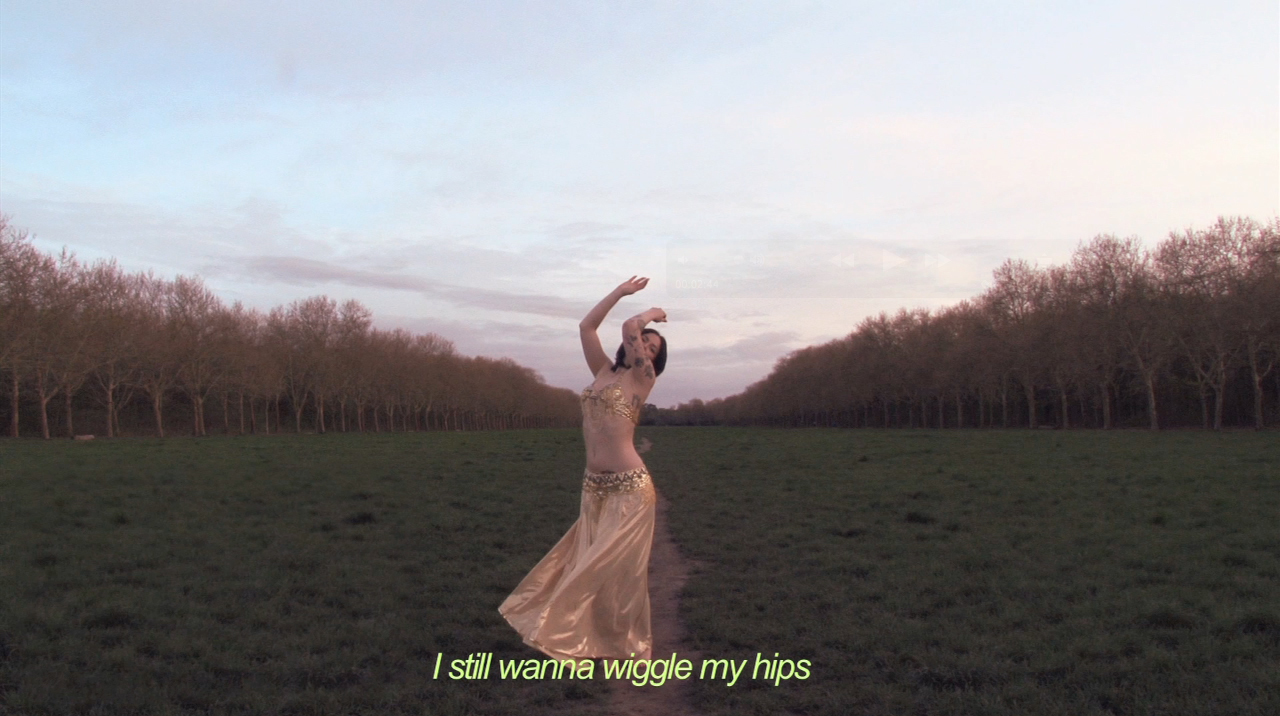Laurence Rossignol — France’s minister of women’s rights — recently hit headlines when she protested about brands that market hijabs. She went as far as comparing women who chose to veil themselves to African-Americans “who supported slavery in the United States.” Around the same period of time, French rapper Booba was boycotted from playing in Lyon after singing about “going to shisha bars to meet ‘beurettes'” (slang for ‘arabic girl’, often sexualised).
Like many French women of Arabic descent, multimedia artist Safia Bahmed-Schwartz longs for a representational space free from clichés, free from modesty or being exotified. Her latest video, Solitude, twists the words of a song by France’s iconic singer Barbara, and appears in a Parisian park wearing futuristic clothes, before breaking into belly-dancing — deconstructing stereotypes about Frenchness and orientalism.
The song you chose addresses loneliness — what does that feeling mean to you?
I chose this song because loneliness is a very contemporary feeling: at a time of accelerating, dematerialized friendships, I feel solitude is at the heart of social media. We all live in a schizophrenic bubble of continuous contacts, hyper-socialization and no tangible contact — both mutually reinforced.
Fashion seems to play an important role in that video.
I’m more interested in clothing than fashion per se. In the first half of the video, I wear a coat by French label Wanda Nylon, because their PVC coats evoke both sex shops and the bourgeoisie. It is reminiscent of the eroticized ‘Jolie Madame’ iconography that emerged in the early 60s (as seen in Luis Bunuel’s Belle de Jour) — women who were both posh and sexual. It was a time when women began to question and escape the patriarchal matrix and that too started with clothing. As for the latter part, I call it my Princess Jasmine costume, which the whole world remembers thanks to Disney. Essentially I work between two clichés, between two princess outfits.
France has flirted with Arabic culture quite a bit, especially in pop culture.
Absolutely, the country created its own local fantasy and folklore in the 90s. We saw the rise of ‘Rai’ music [Arabic music particularly aimed at a French market], traditional mint tea became popular in bobo places, then there was the creation of the Arab World Institute in Paris. It felt wonderful to me that the culture I descended from was not necessarily understood, but at least enjoyed by the mass — even if it led to unavoidable “Oh you’re Algerian? I love couscous!”
You portray yourself in a rather sexualized way. Has that always been the case?
I’ve always played with clothing and its innuendos. From an early age, I realized that what women wore had an impact on how they were perceived, and might used against them if anything happened to them — like “She was asking for it, look what she was wearing.” This has led to radical decisions. I wore the veil at one stage, and then I stopped because I wanted to have that freedom to choose. Today, things are shifting in a dangerous direction: ever since the Paris attacks, people’s fear of terrorism has led to Arabs being stereotyped as potential criminals. Yet this is such a simplistic vision of a minority: not all Muslims are Arabs, not all Arabs are Muslim, you can be religious and not wear a veil, or you can wear a headscarf just because it’s fashionable amongst your peers.
Being an Arab artist in France, you must face so many clichés…
Yes, because we are always trapped between two extreme stereotypes in popular culture: you are either a highly submissive veiled woman, or you are an unholy sexualized ‘beurette’ who spends her days in shisha bars. There ought to be as many representations as there are ways of being Muslim. Religious and cultural identity is so tightly linked to social class, education, country, that referring to Muslim women as one mass is simply inaccurate.
On top of that, you also work around sex — notably your illustration work. Have you been faced with much criticism?
I am aware that I can disturb some people and yes I’ve been faced with all kind of reactions, violent criticism from men and women, guys brutally hitting on me as it my work says I’m up for anything. I don’t stop because it is important to be fall out of a YouPorn vs. aggressive feminism binary. I’m just a biracial 30-year-old woman and I want to be able to fuck who I please, spend the money I’ve made how I wish, and not be faced with macho and patriarchal egos. So I move my hips to Barbara, alone or not, I just want to be left alone to enjoy what I’ve worked for.
Credits
Text Alice Pfeiffer
Image via YouTube
